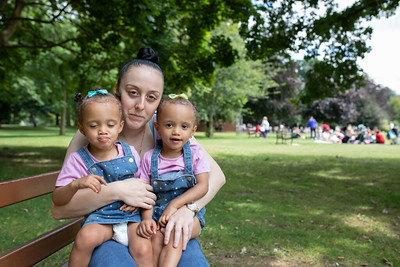Poverty and deprivation
- Milton Keynes ranks 107 out of 151 upper tier and unitary authorities (1 is the most deprived). This overall ranking masks areas of significant deprivation in certain areas of MK, and widening health inequalities.
- 18 out of 152 LSOAs* in Milton Keynes are ranked in the most deprived 20% nationally, with 8 among the most deprived 10%.
- The most deprived LSOAs fall within Bletchley East and Woughton & Fishermead wards. Both are ranked in the 3% most deprived areas in England.
Is poverty and the cost of living affecting your ability to look after your health, and your family's health?
*LSOAs (Lower-layer Super Output Areas) are small areas designed to be of a similar population size, with an average of approximately 1,500 residents or 650 households. There are 32,844 Lower-layer Super Output Areas (LSOAs) in England, Unlike wards, whose population sizes vary widely, the LSOAs provide a consistently-sized statistical unit.
Life expectancy in Milton Keynes
- A baby boy born in Milton Keynes today can expect to live for 78.7 years and a baby girl for 82.4 years.
- Baby boys born in the most affluent parts of our city will live around 7.6 years longer than those born in the most deprived areas. This gap is 5.6 years for baby girls.
- The life expectancy gap is mainly due to higher deaths from circulatory diseases, COVID, cancer and respiratory diseases in more deprived areas. There are higher circulatory deaths in males, and higher cancer and mental health and behavioural deaths in females.

Mortality
- On most measures of mortality, Milton Keynes is comparable to similar local authorities but this masks significant inequalities.
- Death from all causes is 53% higher than expected in Woughton and Fishermead ward, 48% higher in Monkston and 37% higher in Stantonbury (based on England standardised mortality ratio).
- Premature mortality (deaths under 75) from circulatory disease was 77% higher than expected in Woughton & Fishermead and 46% higher than expected in Bletchley East during 2015-9.
- Premature mortality from cancer was 64% higher than expected in Woughton & Fishermead and around 25% higher in both Stantonbury, Bletchley West and Bletchley East in 2015-19.
Source: localhealth.org.uk
Prevalence of certain diseases and long-term conditions
- In 2021, 50.5% of patients had a long-term condition.
- 16.5% of registered patients had caring responsibilties.
- Milton Keynes has a lower prevalence of hypertension (high blood pressure), asthma, diabetes, hyperglycaemia (high blood sugar) and obesity compared with the average across Bedfordshire and Luton.
The key differences from 2018/19 to 2020/21 are:
- Increase of around 2,700 patients with depression.
- Increase of 1,200 more patients with diabetes.
- Increase of 1,100 more patients with high blood pressure.
- 2.47% decrease in obesity prevalence - around 7,200 fewer patients. This is likely due to the reduction in face-to-face consultations during the pandemic.
Have you recently been diagnosed with a long-term condition? Are you satisfied with the care and support that you've received?
Tell us more about your journey

Cancer
25% of deaths in Milton Keynes are caused by cancer.
Participation in some screening programmes is lower than it should be:
- Breast cancer screening take-up is 68.1% (compared with England average of 64.1%)
- Cervical cancer screening take-up is 66.9% among 25-49 year olds compared with an England average of 68%.
- Bowel cancer screening take-up is 64.2%, compared with 65.2% in England.
- Emergency presentations for colorectal cancers are higher in MK than 5 other similar CCGs (Clinical Commissioning Groups; now known as Integrated Care Systems).
- Lung cancer is more prevalent in MK than the average across England.
- 1-year survival from all cancers is lower in Milton Keynes than the national average.
If you've been offered NHS cancer screening but haven't taken it up, what would encourage you to do so?
Smoking
- 16% of Milton Keynes adults are current smokers, rising to 24% among those in routine and manual occupations and 23% among those 18+ with a long-term mental health condition.
- 10% of deaths in Milton Keynes are caused by respiratory diseases.

Children and young people
- In 2018/9, nearly 1 in 5 five year olds had visibly obvious dental decay, the same as England overall.
- 1 in 11 babies born in Bletchley Park weighs under 2500g, compared to 1 in 14 across Milton Keyens Council overall.
- In 2019/250, 21% of reception children were overweight or obese.
- In 2019/250, 33% of Year 6 children were overweight or obese.
- 10% of 5 year olds have not received their second MMR vaccinations
- Uptake of primary vaccinations given in the first months of life is 94.7% which is slightly below the national target of 95%.
Image credits: Centre for Ageing Better
Data source: Bedfordshire, Luton and Milton Keynes Integrated Care Board (unless stated otherwise)
Have you been to the doctor, the dentist, or hospital recently?
Whether your experience was good or bad, we would be grateful if you could spare 5-10 minutes to tell us about it. Using your evidence, we can:
- Identify any gaps in health and care services in MK.
- Highlight where certain communities are experiencing barriers to care.
- Urge our Integrated Care System to make make improvements.